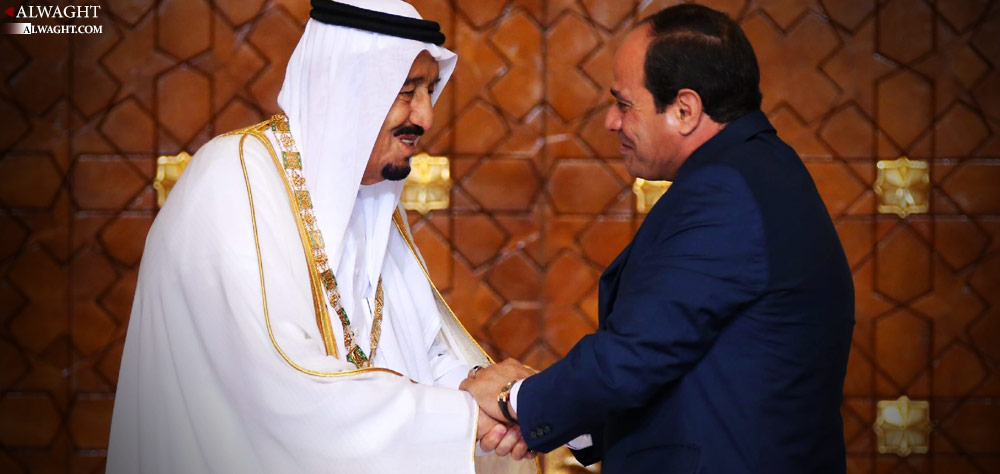Alwaght- Following the collapse of the Ottoman Empire in early 20th century, agreements, such as Sykes-Picot, were stricken between the then global powers such Britain and France which led to drawing new borders between the Islamic territories and emergence of independent states in West Asia and North Africa.
The same time witnessed heated rivalry between regional and international powers to gain influence in the Arab world.
Meanwhile, the efforts to lead the pro-Palestinian Arab front and confront the Israeli regime’s violations were of significance for the competitors.
Egypt in this competition was a forerunner, occupying a special place in the Arab world. During the history of the Arab-Israeli conflicts, Egypt led four wars of Arabs against the Israelis in 1948, 1956, 1967, and 1973. The pro-Palestinian role of Cairo was an ideal for the country’s political elites and civil societies, to the extent that when Anwar Sadat, the Egyptian president from 1970 to 1981, decided to normalize diplomatic relations with Israeli regime through signing Camp David Accords in 1978, an army officer assassinated him.
Since that time, the Arab world has certainly never seen such a lack of sides seeking leadership of the Arab world. Collapse of regimes of Iraq and Libya within a decade, both staged a competition to lead the Arab world, moved the West to contribute the new generation of the Saudi rulers struggle for leadership in the region. The Saudis even went beyond the limits of Hosni Mubarak of Egypt in their push for the region’s peace process which requires recognition of the Israeli regime by the Muslim countries in return for Tel Aviv’s approval for establishment of an independent Palestinian state.
Stepping in this competition had some requirements including setting aside the kingdom’s traditional foreign policy that sought regional balance of power without involvement in the regional conflicts. The new policy is largely run by Prince Mohamed bin Salman, the young and ambitious son of the Saudi King Salman bin Abdulaziz.
Before ascension to the throne of King Salman in early 2015, the Saudis were secretly conspiring against the Iran-backed resistant groups through being in league with the Israeli regime officials. But they always avoided publicizing their relations with Tel Aviv regime. The mediatory role between Israelis and Palestinians was played by the pro-Western government of Hosni Mubarak.
But things have changed since removal of Mubarak in 2011 and assumption of power by Abdel Fatah el-Sisi following a Saudi-backed coup that toppled in 2013 the only democratically-elected president of Egypt Mohamed Morsi. The transformation in the Saudi power structure and rise of bin Salman as the powerful man of the Arab kingdom gave a new face to Arab regime's foreign policy, making it the forerunner of normalizing ties with Israeli regime.
The evidences of such a shift in regional role of Egypt and Saudi Arabia are at hand: Egypt participation in anti-Yemen Arab military coalition as a submissive member, handing over Egypt’s Red Sea islands of Tiran and Sanafir to Saudi Arabia, and joining the Saudi-led blockade campaign to cut ties with Qatar.
All of these measures, mainly taken by green light of West and the Israeli regime, take into consideration serving Tel Aviv's interests. Military action against Yemen to foil the popular uprising led by anti-normalization parties and going to great lengths to deter Ansarullah movement's advancing towards Port of Aden and Bab-el-Mandeb Strain, which serves as the only safe trade route with the world for the Israeli regime now that Tel Aviv is in armed peace with the neighbors, all work in benefit of the Israeli interests.
Severing diplomatic relations with Doha and imposing heavy sanctions against the tiny Island by the pro-Riyadh members of the (Persian) Gulf Cooperation Council to isolate Iran and cut Qatari support for the Muslim Brotherhood, both opponents of Tel Aviv and against diplomatic normalization with it, meet the occupying regime's demands and interests.
Egypt's decision to transfer to Saudi Arabia islands of Tiran and Sanafir, located close to the Sinai Peninsula coasts, also serves The Israeli regime’s strategic interests. During Saudi king visit to Egypt in April 2016, Egypt announced handing over of the two islands to the kingdom in return for a $2 billion aid package to Cairo. Tel Aviv leaders applauded the move Saudi as providing an opportunity for expansion of military and economic cooperation between Riyadh and Tel Aviv based on understanding of “common security threats.”
There are plans to build a bridge between Saudi Arabia and Egypt through these islands. This can additionally represent advantages to Tel Aviv. The bridge will facilitate an oil pipeline from Saudi Arabia to Europe that crosses the Sinai Peninsula and Israeli territories including Port of Haifa. Tel Aviv can benefit from the transit incomes for its own oil consumption expenses, not to mention that it can even undertake the marketing of the oil supplied by the Saudi oil pipeline.
The two islands are important for the Israelis geographically as they lie in the mouth of Gulf of Aqaba. The one who is in control of the islands will have a crucial role in defining threats and opportunities to the Israeli regime. Transfer of the Red Sea islands to Saudi Arabia will mean Riyadh commitment to terms of the Camp David agreements and positive Israeli stances to the Saudi strategy because under the Cairo-Tel Aviv peace deal, Egypt recognized some of the Israeli interests in the area and this commitment extends to the new owner.
Indeed, Egypt after the 2011 revolution and Riyadh-backed coup has become a follower of the new generation of the Saudi leaders as new developers of Arab-Israeli normalization process, distancing from from Arab world leadership aspiration. The Egyptian submission to the Saudi agenda is understandable from Cairo’s siding with Riyadh in Yemen war, giving the islands to the kingdom, and joining the anti-Qatari blockade led by Saudi Arabia.



























